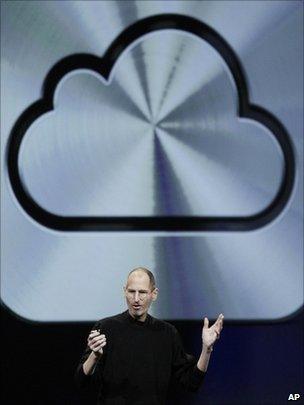The PC is dead, long live the PC
- Published
- comments

Steve Jobs: 'We are going to move the digital hub, the centre of your digital life, into the cloud'
At Apple's Worldwide Developer Conference, external (WWDC), the company declared that we are living in a "post-PC world.
Evidence of that can be seen everywhere the company stated from smartphones to tablet devices. And of course it was noted in front of the 5,200 strong developer audience that Apple was a big driver of this change.
"Especially with the iPad we are ushering in this post-PC world," said Apple exec Scott Forstall who provided some impressive numbers to back this all up.
Sales of 25 million iPads in just 14 months. 200 million iOS devices in total. 15 billion songs downloaded since 2003. 130 million books. 14 billion apps downloaded from a store that now runs to 425,000 apps.
Crucial to this digital new world order, as touted by Apple boss Steve Jobs, is freeing all that data from the confines of the hardware where it lives and the PC where users have to go to transfer or back up things like photos, music, videos and all sorts of other files.
'Poor PC'
At WWDC Mr Jobs suggested that the company's new cloud offering, aptly named iCloud, would help users leave behind the shackles of the old tethered ways.
"About 10 years ago we had one of our most important insights. That was that the PC was going to become the hub of your digital life."
That model Mr Jobs said has broken down as mobile devices became more powerful.
"All these new devices have communications built into them and they can talk to the cloud whenever they want. Now if I get something on my iPhone, it sends to the cloud immediately. We are going to demote the PC to just be a device. We are going to move the digital hub, the centre of your digital life, into the cloud."
Apple CEO Steve Jobs unveils the iCloud service at the company's annual developers' conference in San Francisco
That means software updates will be delivered over the internet. There will be no need to plug an iOS device like your iPhone, iPod touch or iPad into the PC or Mac to activate it. Photos, music, documents, e-mail, contacts and so on will be automatically synced and backed up to the cloud.
"It just works," said Mr Jobs as iCloud stores your content and wirelessly pushes it to all your devices.
By moving to the cloud, it's sayonara PC and Mac.
"Steve Jobs set it up correctly. He said for the last 10 years that Apple has tried to put the Mac at the centre of everything and this is about making the Mac or a Windows PC another device and the centre is now the cloud," said Harry McCracken editor of technology blog Technologizer.com, external.
"But it's tremendously difficult to do the cloud well. Mr Jobs acknowledged that with Mobile Me which was a lot less ambitious and had problems. So this vision does not lack for ambition but it will be a major challenge to do well," added Mr McCracken.
Industry commentator Steven Levy of Wired Magazine, external said all the talk started to make him feel bad for the "poor PC".
"Talking about the cloud and the new update of the operating system for the iPhone and iPad, it's looking more and more like he (Mr Jobs) wants these devices, particularly the iPad to do the work we once did on our PCs," he added.
Is this all just the great march of progress? Mark Hachman who is the news editor of PCMag.com, external said:
"The end of the PC is a step that has been coming for quite some time. These days if you look at content creation it is coming just as much from smartphones and tablets as anything else. I think this is the inevitable way of the future. You see phones like the Motorola Atrix which is a content creation device in itself that can replace the laptop and I think you see it is just another step forward in this direction."
Of course Silicon Valley neighbour Google, which has long been a player in the cloud computing world giving away free apps like Gmail and Google docs, would wholeheatedly agree.
It has been pushing this vision for quite some time and ramped up its efforts last year with the introduction of its Chrome operating system aimed at people who live on the web.
At its own developer conference last month, the tech giant revealed that Samsung and Acer will be bringing out the first Chromebooks later this month to make that vision a reality and give Apple a run for its money.
While Apple wants to ensure that users access the cloud through mobile devices like the iPhone, iPad and iPod Touch it isn't giving up entirely on the Mac.
At WWDC, the company also introduced updates to its Mac OS X software with more than 250 new features, perhaps indicating that one of its most successful products still has some life left in it.